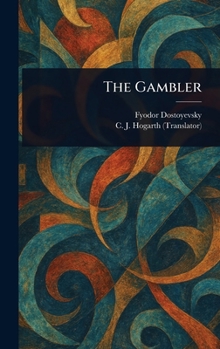The Gambler
Select Format
Select Condition 
Book Overview
Fyodor Dostoyevsky's "The Gambler" delves into the intoxicating world of chance and its grip on the human psyche. Set against the backdrop of roulette tables and high-stakes wagers, this classic of Russian literature explores the destructive nature of addiction. The story is a compelling study of psychological obsession, as characters grapple with the allure and peril of gambling.
Dostoyevsky masterfully portrays the internal conflicts and self-destructive tendencies that arise from the pursuit of fortune. The narrative, driven by suspense and emotional intensity, captures the thrill of victory and the despair of loss. "The Gambler" remains a powerful and relevant exploration of human fallibility, offering a timeless reflection on the human condition and the seductive power of risk. This meticulously prepared print edition preserves the historical integrity of Dostoyevsky's original work, making it accessible to readers interested in classic psychological fiction.This work has been selected by scholars as being culturally important, and is part of the knowledge base of civilization as we know it.
This work is in the public domain in the United States of America, and possibly other nations. Within the United States, you may freely copy and distribute this work, as no entity (individual or corporate) has a copyright on the body of the work.
Scholars believe, and we concur, that this work is important enough to be preserved, reproduced, and made generally available to the public. We appreciate your support of the preservation process, and thank you for being an important part of keeping this knowledge alive and relevant.
Customer Reviews
The Third Fyodor Dostoyevsky story I have read.
Gambling On Greatness
Beauty Amid Ashes.
The loser takes it all
Existential Delight
An engrossing, fun short work
The Gambler Mentions in Our Blog

Fyodor Dostoyevsky's successful first book, Poor Folk, came out 175 years ago today when the author was only 24 years old. But in a life beset by drama worthy of, say, a Russian novel, it would be many years before he produced a notable follow-up. Here we explore the literary giant’s best books and how they mirror his extraordinary life.






